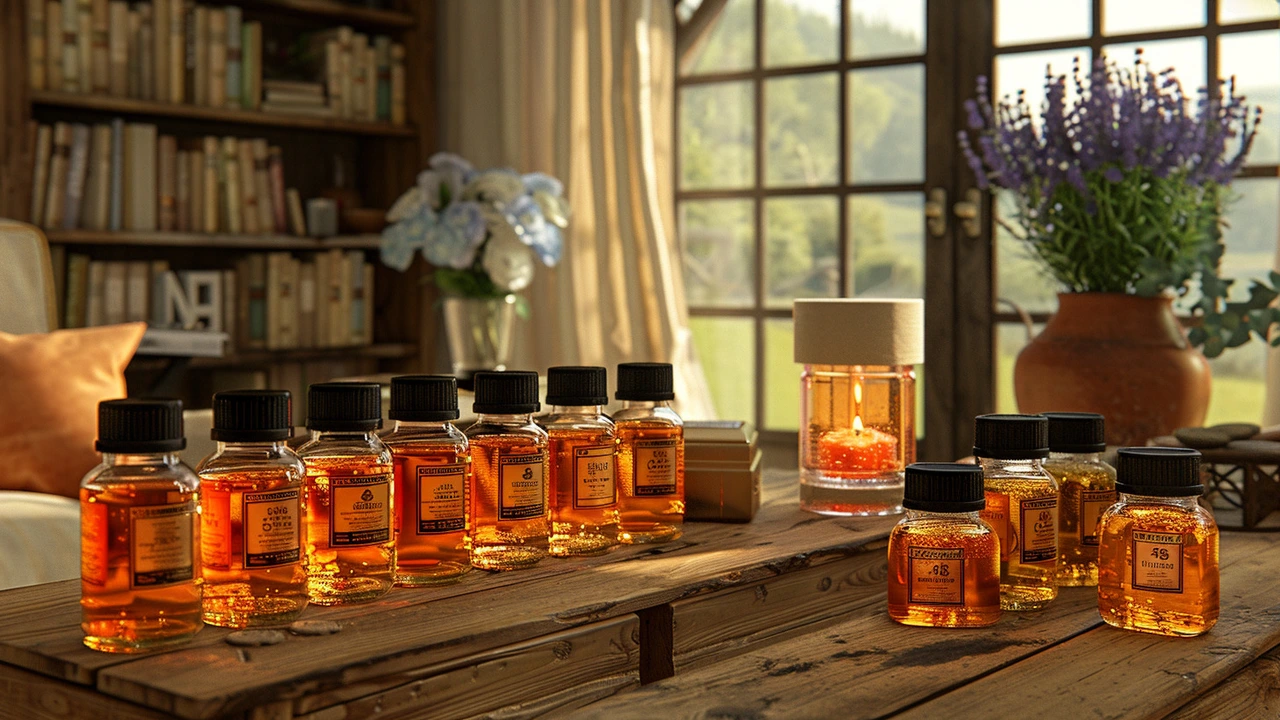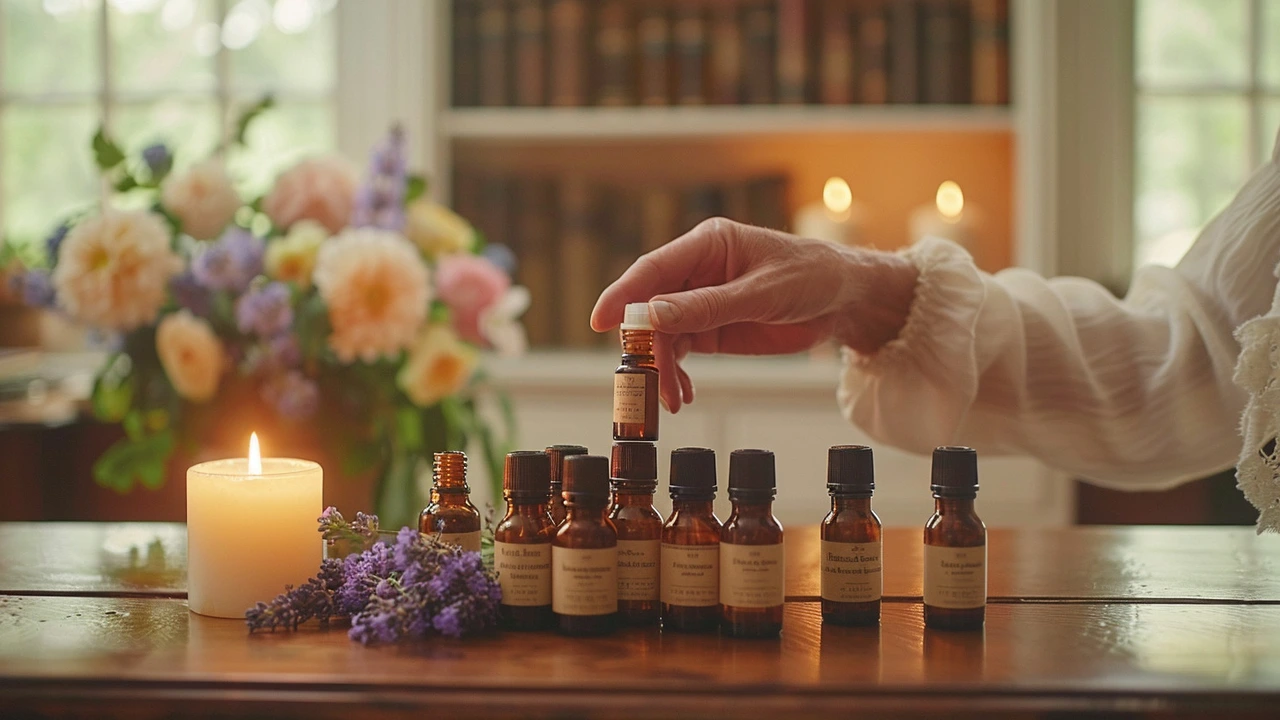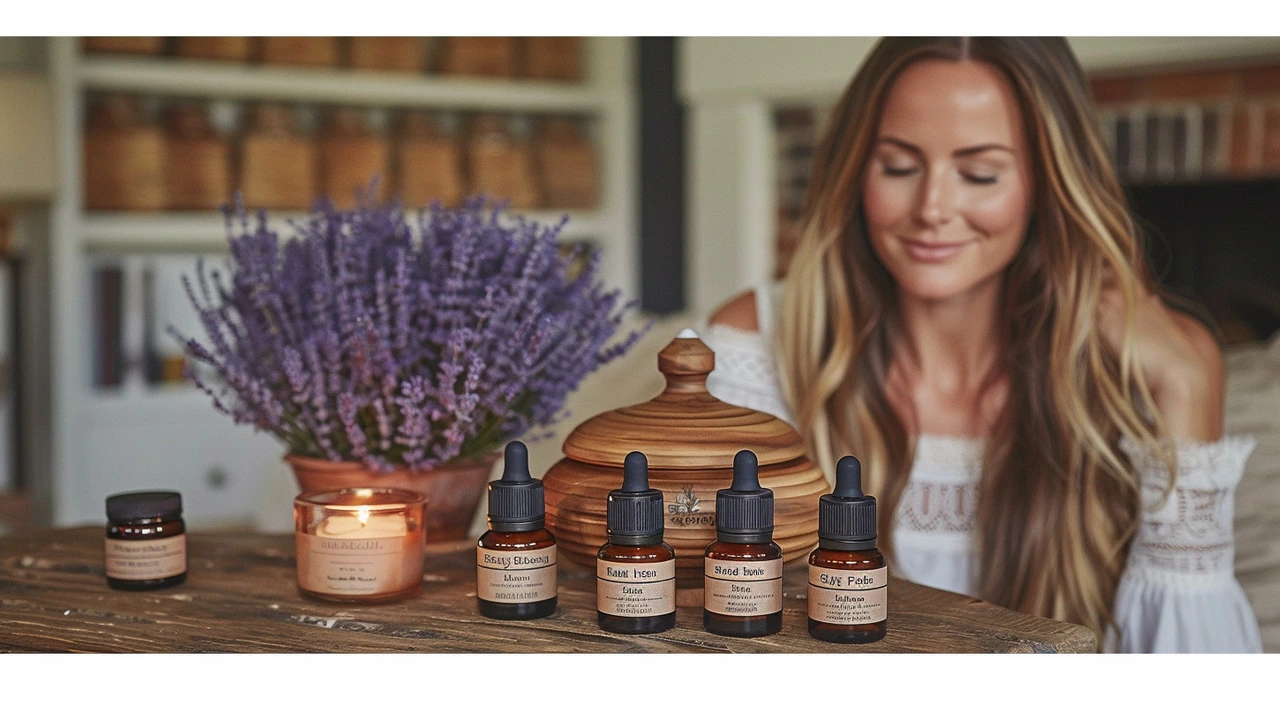
Aromatherapy has been around for thousands of years. From ancient Egypt to modern times, people have used scented oils extracted from plants for healing and relaxation.
This natural therapy relies on the potent properties of essential oils. Each has its own unique benefits, from calming your mind to boosting your energy levels.
If you're new to aromatherapy, this guide will help you navigate the basics. You'll learn what aromatherapy is, how it can benefit you, which oils are popular, methods of using these powerful scents, and important safety tips.
By the end, you'll have the knowledge to start your own aromatic journey, enhancing your well-being one scent at a time.
- What is Aromatherapy?
- Benefits of Aromatherapy
- Popular Essential Oils
- Methods of Use
- Safety Tips and Getting Started
What is Aromatherapy?
At its core, aromatherapy is a holistic healing treatment that uses natural plant extracts to promote health and well-being. Often referred to as essential oil therapy, aromatherapy has been practicing for centuries and involves the use of aromatic essential oils medicinally to improve the health of the body, mind, and spirit. It enhances both physical and emotional health.
The history of aromatherapy is rich and varied. Ancient cultures in Egypt, China, and India used aromatic plants in balms, perfumes, and medicines. They believed that aromatic oils had physical and spiritual healing properties. In the early 20th century, French chemist René-Maurice Gattefossé coined the term 'aromatherapy' after discovering the healing powers of lavender oil in treating burn wounds.
“Aromatherapy can uplift the mood, alleviate stress, and even improve cognitive function and physical well-being,” says Dr. Jane Buckle, a leading expert in the field.
The essential oils used in aromatherapy are highly concentrated plant extracts obtained via different methods, including distillation and cold pressing. These oils capture the plant's scent and flavor, or its 'essence.' Each essential oil has unique active ingredients, which determine how the oil is used.
For example, lavender is known for its calming properties, while peppermint can invigorate and energize. When used in aromatherapy, these oils are either inhaled or applied to the skin. The inhalation method stimulates the olfactory system, which directly affects the brain through the limbic system—the area responsible for emotions and memory. This connection explains why certain smells can trigger emotional responses or memories.
When applied to the skin, essential oils are absorbed into the bloodstream and can provide localized as well as systemic effects. Some essential oils have antibacterial, antiviral, or antifungal properties, making them beneficial in treating various health issues.
The practice of aromatherapy isn't just about using any fragrance. It's about the scientific process of mixing and utilizing these aromas for a specific purpose. By understanding the unique properties of each essential oil, practitioners can tailor treatments to the specific needs of individuals. Whether it’s relieving stress, improving sleep, alleviating pain, or enhancing mood, aromatherapy offers a natural alternative to traditional medicine.
As people continue to seek out more natural ways to improve their health, the popularity of aromatherapy grows. This practice is now commonly found in spas, wellness centers, and even hospitals, demonstrating its broad acceptance and effectiveness.
Benefits of Aromatherapy
Aromatherapy offers a multitude of benefits for both mind and body. At the core, it leverages the potency of essential oils, which are concentrated extracts from plants with therapeutic properties. One of the most well-known benefits of aromatherapy is its ability to reduce stress and promote relaxation. Lavender oil, for example, is renowned for its calming effects, often used to alleviate symptoms of anxiety and improve sleep quality. A drop or two into a diffuser can transform your space into a soothing retreat, helping to ease away the tension of a long day.
Another significant benefit of aromatherapy is its ability to enhance mood and emotional well-being. Citrus oils like lemon and orange are well-known for their uplifting and invigorating scents. They can help combat feelings of fatigue and boost your overall sense of well-being. When diffused in the morning, these oils can provide a natural pick-me-up, setting a positive tone for the day ahead. Furthermore, many people find that certain scents can trigger happy memories, creating a powerful connection between smell and emotional response.
Aromatherapy can also play a pivotal role in pain management. Essential oils like peppermint and eucalyptus are frequently used to relieve headaches and muscle pain. When applied topically in a diluted form, they can provide cooling relief and reduce inflammation. This makes aromatherapy a valuable companion for those looking to manage chronic pain conditions naturally.
Respiratory health is another area where aromatherapy excels. Oils such as eucalyptus and tea tree have antibacterial and antiviral properties, making them effective in supporting respiratory function. Inhaling these oils can help clear congestion and ease symptoms of colds and allergies. Many people turn to these oils during flu season to bolster their immune system and keep their airways clear.
Moreover, aromatherapy has been shown to improve cognitive function. Essential oils like rosemary and peppermint are known to enhance focus and memory. Students and professionals often use these scents during study sessions or work hours to boost concentration and productivity. A quick inhale from a personal diffuser or a few drops on a tissue can make a noticeable difference in mental clarity.
“Aromatherapy is a powerful tool in integrative medicine that offers both psychological and physical benefits,” says Dr. Jane Buckle, author of ‘Clinical Aromatherapy: Essential Oils in Healthcare.’
In addition to psychological and cognitive benefits, aromatherapy can support skin health. Essential oils like tea tree and lavender have antiseptic and anti-inflammatory properties that can be beneficial for acne and other skin conditions. When added to skincare routines in diluted forms, they can promote clear and healthy skin.
Finally, aromatherapy can be a valuable part of a self-care routine. The simple act of taking time to engage with pleasing scents can cultivate mindfulness and self-awareness. This practice can enhance your daily life, making mundane activities feel more luxurious and intentional. Whether it’s a relaxing bath with a few drops of essential oil or a meditation session with a carefully chosen aroma, aromatherapy provides a sensory experience that promotes holistic well-being.

Popular Essential Oils
When diving into the world of aromatherapy, understanding the variety of essential oils available can be both exciting and overwhelming. These potent extracts hold different properties, each bringing its own unique benefits. From helping to soothe the mind to boosting physical well-being, these oils can be used in many ways for numerous purposes. Below, you'll find some of the most popular essential oils and what makes them so widely cherished.
Lavender oil is often considered the jack-of-all-trades in aromatherapy. Known for its calming effect, it is commonly used for relaxation, stress relief, and aiding sleep. Its gentle scent has been found to reduce anxiety levels and improve sleep quality. An interesting fact about lavender is that during World War I, it was used to disinfect hospital floors. This shows just how versatile this oil can be!
"Lavender oil calms the nervous system, lowers blood pressure and heart rate, and puts you in a relaxed state," says Dr. Brian King, a prominent neuroscientist.
Peppermint oil is another popular choice. This oil has a refreshing and invigorating scent, which is perfect for boosting energy and alertness. It's often used to reduce headaches and migraines due to its cooling and soothing properties. Some people also use peppermint oil to relieve muscle and joint pain.
When it comes to fighting infections, tea tree oil is your go-to. Known for its antibacterial, antifungal, and antiviral properties, this oil can be used to treat various skin conditions, from acne to athlete's foot. Its powerful healing properties make it a staple in many households.
Eucalyptus oil is widely used for respiratory issues. It helps to clear nasal congestion, making it a great natural remedy during cold and flu seasons. The refreshing scent also helps to revitalize and refresh the mind.
Lemon oil is praised for its uplifting and cleansing properties. This citrusy oil is often used in cleaning products due to its ability to purify and disinfect surfaces. Its energizing scent can also improve mood and concentration.
Other Noteworthy Essential Oils:
- Chamomile oil: Known for its relaxing properties, chamomile is excellent for reducing stress and promoting sleep.
- Jasmine oil: Used for its aphrodisiac qualities and emotional benefits, jasmine oil can help with mood swings and depression.
- Frankincense oil: Often used in spiritual practices, this oil can help to promote a sense of peace and relaxation.
- Rosemary oil: Known for its memory-boosting properties, rosemary can enhance focus and support brain function.
- Bergamot oil: With its citrusy yet spicy scent, bergamot is great for reducing anxiety and lifting the mood.
Remember, the world of essential oils is vast, and these are just a few examples. When starting out, it's beneficial to experiment and find the scents and properties that work best for you. Always use these oils with caution and as per the recommended guidelines to prevent any adverse reactions. Your journey into aromatherapy can be both exciting and rewarding, with each scent offering a new path to well-being.
Methods of Use
When it comes to using aromatherapy, there are several methods you can explore. Each way allows you to experience the beneficial effects of essential oils in different manners. Some methods are more suitable for relaxation, while others can invigorate and stimulate your senses.
One of the most popular methods is through diffusion. This involves dispersing the essential oils into the air, typically with an electric or natural diffuser. By inhaling the dispersed particles, you can enjoy their soothing and therapeutic effects. Electric diffusers are user-friendly and often come with settings to control the intensity and duration of the diffusion.
Another effective method is topical application. This involves applying diluted essential oils directly to your skin. It's crucial to dilute the oils with a carrier oil, such as coconut or jojoba oil, to avoid skin irritation. Popular areas for application include the wrists, temples, and soles of the feet. This method allows the oils to be absorbed into your bloodstream, providing localized benefits.
Inhalation through steam is another method worth exploring. By adding a few drops of essential oil to a bowl of hot water, the steam can help you inhale the aroma deeply into your respiratory system. This method is particularly effective during cold and flu season, providing respiratory relief and opening congested airways.
Baths infused with essential oils can turn a regular soak into a spa-like experience. Adding a few drops of essential oil to your bathwater can transform it into a calming retreat. It's like giving your body a gentle embrace of wellness, perfect after a long day.
Using essential oils in massage enhances the benefits of both the oils and the massage itself. The combination of touch and scent can significantly reduce stress and tension in your muscles. Many professional therapists incorporate essential oils into their routines for this reason.
For a less common, but equally enjoyable method, you can create aromatherapy sprays. By mixing essential oils with water in a spray bottle, you can spritz the mixture around your home, office, or even on your linens. This method is great for quick refreshment and bursts of scented joy.
“Essential oils can lift the mood, calm the senses, and get you ready for a great day.” - Robert Tisserand, author and aromatherapy expert.
For those who enjoy DIY projects, you can incorporate essential oils into homemade products. Create your own scented candles, lotions, and soaps with your favorite aromas. This not only makes your products more personalized but also more enjoyable to use.
Whether you are diffusing, applying, inhaling, bathing, massaging, spraying, or crafting, there’s a method of aromatherapy that can seamlessly fit into your lifestyle. With all these options, you can find the perfect way to harness the power of scents and incorporate them into your daily routines.

Safety Tips and Getting Started
Before diving into aromatherapy, understanding how to use essential oils safely is crucial. These oils are powerful, and improper use can lead to unwanted side effects. First, always conduct a patch test. Apply a small amount of diluted oil on your skin and wait 24 hours to see if any reaction occurs. This simple test can help you avoid allergic reactions or skin irritations.
When using essential oils, dilution is key. Pure essential oils are highly concentrated and should not be applied directly to the skin. Instead, mix them with a carrier oil like coconut or jojoba oil. Typically, a safe dilution ratio is one drop of essential oil per teaspoon of carrier oil. This ensures that the oil is gentle on your skin but still effective.
Next, pay attention to proper storage. Essential oils are sensitive to light and temperature. To preserve their quality, store them in dark glass bottles, away from direct sunlight and heat sources. A cool, dark place, such as a cabinet, is ideal for maintaining their potency. Also, keep the bottles tightly closed to prevent oxidation.
Some essential oils are not safe for certain groups of people. For example, pregnant or breastfeeding women should avoid oils like clary sage and rosemary. People with sensitive skin or respiratory issues should also be cautious with potent oils like peppermint or eucalyptus. When in doubt, consult with a healthcare professional before using any essential oil.
Another important tip is to avoid ingesting essential oils unless guided by a certified aromatherapist. Ingesting oils can be harmful and is generally not recommended for beginners. The nose and skin are typically the safest ways to enjoy the benefits of aromatherapy.
"Always start with small doses and gradually increase. Essential oils are powerful, and less is often more." - National Association for Holistic Aromatherapy
So how do you get started with aromatherapy? First, choose a few beginner-friendly essential oils. Lavender, lemon, and peppermint are good starting points due to their versatile and well-tolerated nature. You might also want to invest in a quality diffuser. This device disperses essential oils into the air, allowing you to enjoy their scents easily and safely. To use a diffuser, fill it with water, add a few drops of your chosen essential oil, and turn it on. It’s that simple.
Additionally, incorporating essential oils into your daily routine can enhance your well-being. Add a few drops to your bath for relaxation, or create a pillow spray using calming oils like lavender to improve your sleep. Experiment with different scents and find what works best for you.
To wrap it up, starting with aromatherapy is straightforward if you follow safety guidelines. By choosing the right oils, using them correctly, and being mindful of potential risks, you can unlock the beneficial world of aromatherapy. So go ahead, take the first step into this fragrant journey and explore the natural way to boost your mind and body.
